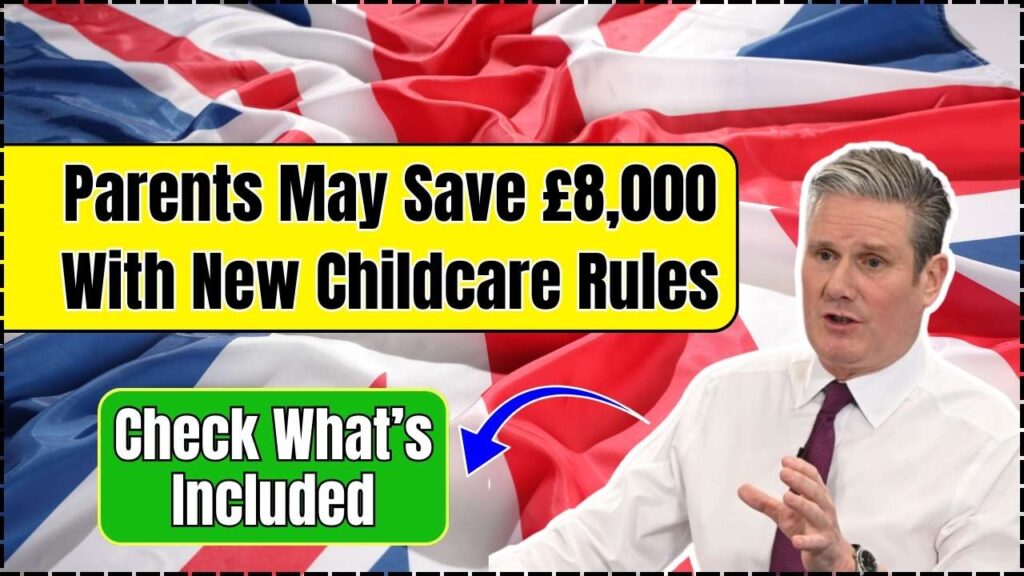Parents May Save £8,000 With New Childcare Rules: If you’re a parent in England, new childcare rules starting September 2025 could help you save up to £8,000 annually on childcare and related costs. These changes expand the availability of free funded childcare hours and introduce additional benefits like free breakfast clubs and capped school uniform costs. Whether you’re a working parent juggling finances or a professional advising families, understanding these updates can help you make informed decisions and plan your budget wisely.

In this article, we’ll break down the key details about the new childcare rules, explain who qualifies, guide you through how to apply, and share practical advice on maximizing your savings. We’ll also include important statistics, official resources, and clear examples to help you fully grasp the benefits.
Parents May Save £8,000 With New Childcare Rules
| Feature | Details |
|---|---|
| Effective Date | September 2025 |
| Eligible Child Age | From 9 months up to 4 years |
| Free Funded Hours | Up to 30 hours per week for 38 weeks per year |
| Additional Benefits | Free breakfast clubs, capped school uniform costs |
| Estimated Savings | Up to £8,000 per year per child |
| Eligibility Criteria | Working parents meeting income and employment thresholds |
| Application Portal | gov.uk/childcare-calculator |
The new childcare rules launching in September 2025 present a fantastic opportunity for working parents in England to significantly reduce their childcare expenses — potentially by up to £8,000 per child per year. These changes not only ease financial pressures but also promote early childhood development, gender equality, and workforce participation.
By understanding eligibility, applying correctly, and using the full range of available benefits, parents can confidently navigate the system and maximize their savings while ensuring quality care for their children.
Understanding the New Childcare Rules
The UK government’s childcare policy has evolved to support working families better by reducing the cost burden of childcare — which is often one of the biggest expenses for parents. Previously, free funded childcare was mainly available for children aged three and four. Starting September 2025, the eligibility extends to children aged 9 months and older, providing up to 30 free childcare hours per week during term time (38 weeks a year).
Why Is This Important?
Childcare costs in the UK are among the highest in Europe. According to the Family and Childcare Trust, average childcare fees can reach over £15,000 per year for a child under two. These new rules are designed to:
- Enable more parents to return to work or increase working hours.
- Support early childhood development through more access to quality childcare.
- Provide financial relief by offsetting expensive childcare fees.
These changes build upon the earlier 15 hours of funded childcare for younger children, which already helped nearly 500,000 families and especially benefited those with lower incomes.
Who Is Eligible for the Free Childcare?
Understanding eligibility is essential so you know if you can benefit from the new rules.
Basic Eligibility Criteria:
- Child’s Age: Your child must be at least 9 months old by the start of the term and under 4 years old.
- Parent’s Employment Status: Both parents must be working (or the single parent if a lone parent household).
- Minimum Earnings: Each parent must earn at least the equivalent of 16 hours per week at the National Minimum Wage or National Living Wage.
- Income Cap: Parents earning over £100,000 annually are not eligible.
- Residency: Parents and children must live in England.
- If you meet these requirements, you could be entitled to the full 30 hours of free childcare per week.
How Does the Free Childcare Work?
Breakdown of the Offer:
- 30 hours per week, spread over 38 weeks (school terms) each year.
- That’s equivalent to 1,140 free childcare hours annually.
- The scheme covers registered childcare providers, including nurseries, childminders, and playgroups.
Additional Benefits Included:
- Free Breakfast Clubs: Many schools are expanding free breakfast clubs, providing healthy meals and supervision before school starts.
- Capped School Uniform Costs: New rules limit how much schools can charge for uniforms, helping families save on this significant expense.
- Together, these can save families up to £8,000 annually per child.
The Positive Impact on Employment and Gender Equality
Access to affordable childcare is a key factor in parents, especially mothers, returning to work or increasing working hours. According to the Department for Work and Pensions, women are disproportionately affected by childcare costs, leading to career breaks or reduced hours. By expanding free childcare, these new rules support greater workforce participation and gender equality.
Employers and policymakers also benefit from a more diverse and stable workforce, making this a positive development for the entire economy.
Ensuring Quality: Childcare Providers and Ofsted Inspections
The free childcare is only available through Ofsted-registered providers who meet strict quality and safety standards. These providers undergo regular inspections, ensuring children receive high-quality care and early education. You can check provider ratings and inspection reports on the Ofsted website.
This focus on quality ensures that the free childcare doesn’t just save money but also supports children’s learning and wellbeing.
How These Changes Fit Into Broader Government Family Support
The expanded childcare offer is part of the government’s Early Years Foundation Stage (EYFS) strategy and wider efforts to improve family support services. It complements initiatives like Tax-Free Childcare, parental leave reforms, and increased investment in early education.
Understanding these interlinked policies helps parents and professionals navigate the full range of support options available.
Common Challenges and Overcome Them
While the new rules bring many benefits, some parents may face hurdles:
- Delayed Applications or Approvals: Apply early, ideally six weeks before the term starts.
- Confusion About Eligibility: Use official online tools and contact local authorities for guidance.
- Limited Local Provider Availability: Check multiple providers early and consider registered childminders as an alternative.
- Changing Work Hours or Income: Keep your provider updated to avoid repayment issues.
- Local councils often offer advice and additional support for families struggling to access childcare.
Parents May Save £8,000 With New Childcare Rules Apply for Free Childcare
Parents May Save £8,000 With New Childcare Rules Guide:
- Check Eligibility Online: Visit the official childcare calculator at gov.uk/childcare-calculator to confirm if you qualify.
- Create a Government Gateway Account: If you don’t have one, create an account on the UK government website.
- Submit Application: Provide details such as National Insurance number, employment status, and income information.
- Receive an Eligibility Code: If eligible, you’ll be sent an 11-digit code to share with your childcare provider.
- Share with Provider: Give your code to the registered childcare provider who will verify and begin your free childcare entitlement.
Tip: It’s recommended to apply at least six weeks before the start of the school term to ensure your place and benefits are confirmed in time.
Real-Life Examples of Savings
- Emma, a single mother working full-time, previously paid £550 per month for childcare for her 2-year-old son. With the new 30-hour entitlement, she could save nearly £6,600 annually.
- James and Laura, both working full-time, will now have access to free breakfast clubs and capped uniform costs, reducing their annual childcare-related expenses by over £8,000 for their two children.
FAQs On Parents May Save £8,000 With New Childcare Rules
Can self-employed parents apply for free childcare?
Yes, self-employed parents are eligible provided they meet the minimum earnings and work requirements. Proof of income such as tax returns may be required.
What if my income fluctuates?
If your circumstances change, notify your childcare provider and the government portal promptly to avoid overpayments that might need repayment later.
Are all childcare providers included?
No. Only registered and approved providers can offer funded childcare. You can check if your provider participates by contacting them or using the government’s childcare provider search.
What happens when my child turns 4?
The 30 hours of free childcare continue until your child starts compulsory education, after which other government schemes apply.
Maximizing Your Benefits
- Plan Early: Don’t delay applying. Early application guarantees smoother processing.
- Stay Informed: Policies may update yearly. Bookmark gov.uk/childcare to track changes.
- Combine Benefits: Look into other programs like Tax-Free Childcare accounts for additional financial support.
- Use Registered Providers: Confirm your provider accepts free funded hours to avoid unexpected charges.






